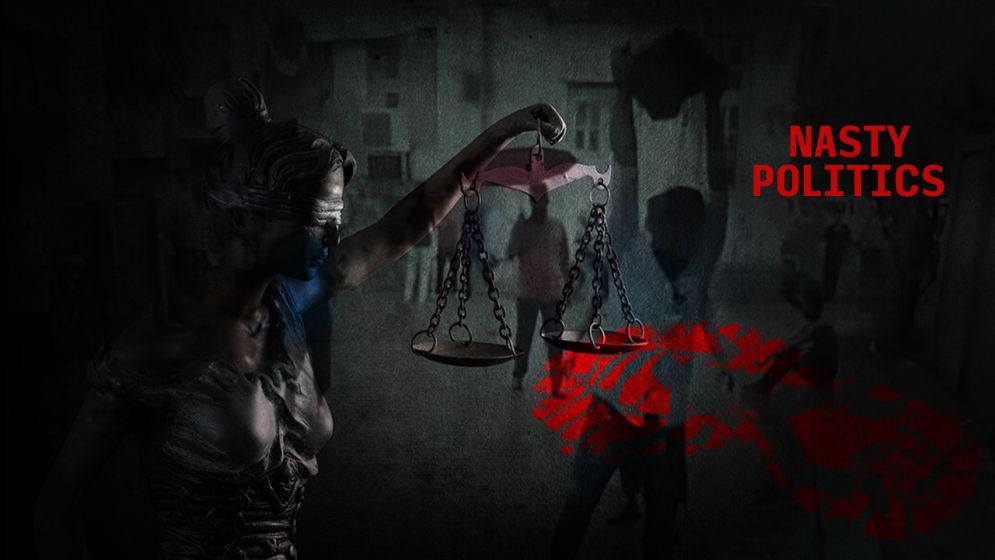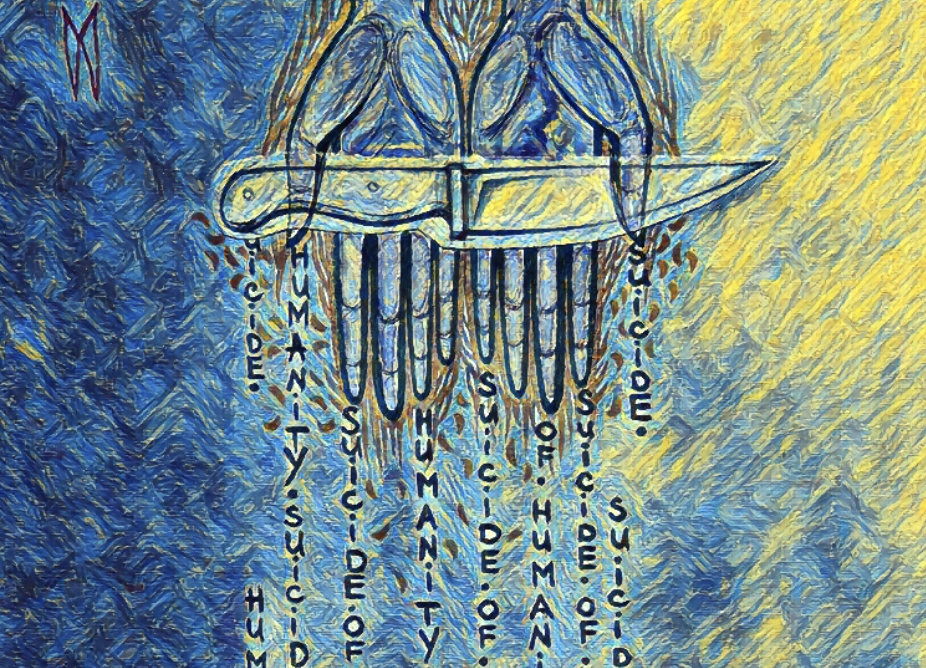Bangladesh has enough of the monstrous cynicism of turning murder into political capital

In the wake of the horrific murder of a businessman in front of Salimullah Medical College, a familiar and sinister pattern is reemerging: political opportunists are exploiting tragedy for partisan gain.
What could be more grotesque than using a corpse as a campaign prop? Yet, here we are again–caught in the vicious cycle of death turned into political currency.
It’s not a new tactic though. Over the years, nearly every political camp in Bangladesh has played this sordid game. But today’s variant is more insidious. A new chorus of self-appointed intellectuals–many of them conveniently stationed abroad–now claim to be the sole interpreters of what July means.
They speak with the smug authority of those who weren’t here when the streets burned, when real risks were taken, when standing up meant possibly disappearing. From the safety of distant cities, they weave airtight theories and declare the matter settled.
These pundits, dressed in moral superiority and fluent in online sanctimony, insist that ‘24’ is a partisan project. They call it Jamaat, Shibir, or Chhatra Dal in disguise. But ‘24’ is not a party–it’s a reckoning. And those now weaponizing language to smear the movement as a front for one political force are engaging in a covert operation of their own.
For over a decade, they have practiced selective criticism cloaked as journalistic integrity. Now, faced with an uprising that challenges the status quo, they double down–mocking, discrediting, and gaslighting those who dissent.
Let’s make a distinction they conveniently blur: criticism is not the same as character assassination. But for 15 years, the Dartyians, Prothom Alo, and their media allies have collapsed that distinction.
They masquerade as guardians of truth while trafficking in convenient half-truths and malicious spin. And in the aftermath of July 5, a date that marked the death of narrative politics, they still cling to their obsolete playbook.
They don’t realize the terrain has shifted. We’ve entered a post-narrative age–people aren’t buying what they’re selling. The politics of spin has been exposed and discredited.
And those who continue to traffic in this bankrupt style will meet the same fate: irrelevance.
Their desperation is palpable. They call you an agent of foreign powers if you speak out. They accuse you of ambition while building careers off manufactured outrage. They flood social media with bots, use “haha” as digital sneers, and mount coordinated attacks to simulate public opinion.
It’s populism, hysteria, and spin–eerily similar to Awami League's own playbook. And yet, they accuse you of being a League apologist.

Post uprising political alignment
Here’s what truly terrifies them: a post-5th political realignment. One that demands reforms from all parties. One that transcends factionalism.
But instead of welcoming dialogue, they squash it. They practice selective humanitarianism, twist facts into fictions, and silence any voice that doesn’t echo their own. If you push back, they destroy your reputation.
If you remain silent, you're branded a traitor. The only permissible stance is total allegiance to their version of the truth.
This is not dissent. This is not democracy. This is the Awami League’s model, reincarnated under a different flag.
Bangladesh deserves better. It deserves political reform across the board, not the hollow morality of part-time exiles and algorithm warriors. And it certainly deserves more than turning the murdered into martyrs for political memes.
We must reject this grotesque theater.
I have this conviction that they will be defeated by the natural erosion of their politics. Bangladesh has entered a new phase, one the Awami League failed to recognize until it was too late: the post-narrative era.
This is more than just a shift in rhetoric; it is a foundational change in how legitimacy is earned. No longer can authority be manufactured through tightly scripted myths or social media theatrics. The people no longer believe in fictions packaged as facts.
Those now trying to inherit power without offering anything beyond noise are making the same fatal error. They lack not only narrative coherence but also moral seriousness. And worse, they imitate the very behaviors that brought the League to ruin–intolerance, arrogance, and a grotesque sense of entitlement.
If they continue to act like the Awami League on the ground, they will suffer the League’s fate. The path forward isn't mimicking yesterday’s power structures; it’s rejecting them.
Only politics grounded in service, accountability, and real public engagement can endure.
To those panicked by the weaponization of falsehoods, a reminder: the Awami League spent billions constructing an industrial-scale narrative machine–and even that collapsed under the weight of public disillusionment.
What chance do these digital dilettantes have? Most haven’t even grasped the basics of political reality. They operate like children with toys, mistaking memes for movements and hashtags for history.

Fiction guise as facts will not work
Their only consistency is their treachery; they habitually align with anti-national forces, often in the service of vague, foreign-scripted goals.
These are obviously not builders. They are brokers–of confusion, division, and despair. In a moment where Bangladesh needs clarity, they peddle ambiguity. When caught in manipulation, they don’t answer; they accuse.
Critics become “R-agents” or BNP collaborators. It’s an old trick. But here’s the truth: the BNP doesn’t need self-appointed gatekeepers or shadowy whisperers. If anything, those claiming to speak for it while engaged in backroom machinations are frauds–neither intellectuals nor allies.
We have to understand that the era of grand narratives has ended. What lies ahead is harder, more demanding: a value-based state, built by individuals of principle.
Not thieves. Not careerists. Not the morally bankrupt leftist fantasists who dream of ruling like technocrats under foreign protection, their vision of Bangladesh reduced to a docile client state under a "Hamid Karzai model."
These people are not reformers. They are scavengers–using the efforts and sacrifices of others to position themselves for a future no one voted for.
They will fail. But if, by some chance, they succeed, their betrayal will come full circle. They will be the first to be cast aside–labeled extremists, then eliminated. History is unkind to those who mistake manipulation for strategy.
As for the latest campaign of lies against us–I am not surprised. They are not in the business of truth, nor do they feel shame when exposed. Their false narrative will collapse, not because we demand it, but because in a post-modern world, such grand deceptions are unsustainable.
They vanish under the weight of their own contradictions.
The battle ahead is against a mindset–one that sees citizens as subjects, truth as inconvenience, and power as birthright. That mindset is finished. And those who refuse to evolve with it will be, too.
Citing philosopher Byung-Chul Han’s The Crisis of Narrative, one is reminded that narratives collapse the moment their constructed nature is revealed.
Once the illusion of inner truth is broken, unity disintegrates–and all that’s left is propaganda. That is the moment we now face.

Seeing through the noises
The recent, brutal incident–ostensibly a confrontation over extortion–was in fact a turf war, a violent clash over business control and street-level dominance.
It had less to do with ideology and more to do with raw power. And while the BNP may not have authored the violence directly, it is culpable for the collective punishment that followed. The party must answer for the criminality that thrives under its name–and if that means disbanding its youth wing, Jubodal, then so be it.
But instead of accountability, we witnessed evasion. Instead of reckoning, we got spin. A familiar script was rushed into circulation–one that deliberately distorted the event to shield the party and redirect blame.
This is textbook manipulation. We saw the Awami League deploy it for decades, most infamously in how it constructed and weaponized its version of 1971. That narrative, too, eventually cracked under its own contradictions. So will this.
And yet, there remains the galling question: who profits from all this deception? Who benefits from the reflexive outrage, from the selective reading, from the coordinated campaign to smear dissenting voices without so much as engaging with their actual words?
The answer is as cynical as it is dangerous: those who are now mimicking the worst aspects of fascist playbooks. Yes, the tactics are unmistakable. Demonize dissent. Police language. Replace debate with denunciation.
In Germany, such tactics were used by those who weaponized historical trauma to create a fortress of moral unassailability. Here, similar dynamics are unfolding–by people who once called themselves victims but now aspire to dominate.
The irony is sickening. Their strategy? Hollow outrage and social intimidation, built atop a scaffolding of false moral superiority. Their goal? Control. And like all tyrants-in-waiting, they are blind to the backlash they are courting.
Should they seize power, they will inevitably cannibalize their own. Many of them have forgotten–or choose to ignore–that I stood by them when it was risky to do so. I defended their right to exist in the face of state repression.
But that loyalty was never blind. It was built on the hope that, one day, they would evolve into a democratic force. That hope is fading because of their own cowardice and duplicity.
I urge them, still, to stop harming themselves. Stop harming the country. Shed the lies. Earn back trust–not with slogans, not with viral posts, but with truth.
Because the very arrogance that doomed the Awami League now infects its supposed opposition. The belief that one is too clever, too virtuous, too strategic to fail–that is the precise moment failure begins.
Let this be a warning to the BNP, Jamaat, NCP, or any movement that seeks to fill the political vacuum. The country has no appetite for another master class in manipulation.
It wants governance. Service. Truth. If you cannot provide that, then you are not the future–you are the past, reheated.
May Allah protect Bangladesh.
—-
Rezaul Karim Rony is a writer and thinker. He is the editor of Joban magazine.

